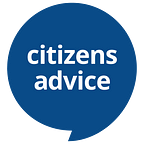Our new approach to digital advice
By Beatrice Karol Burks
Over the last nine months we’ve learnt a huge amount about what people are looking for from Citizens Advice online, enough that we feel confident putting together a first draft of a ‘content proposition’, outlining a hypothesis and approach to developing digital advice.
We’ll iterate this as we test more content and get feedback from clients and advisers. We’ll also broaden this to develop a proposition about how we can best support advisers to deliver advice.
For now, here’s our interim content proposition:
[stag_divider style=”strong”]
Interim proposition
Citizens Advice currently hosts myriad topics that give advice on what something is and tries to cover every angle — despite there being little or no evidence that we need to do so.
As a charity competing in a saturated marketplace, we now need to be ruthless in focusing on the core proposition of the organisation: we help people to solve a problem.
We don’t need to tell people what something is — they wouldn’t be coming to us if they didn’t know it affects them — we need to tell them what they can do with their current circumstance.
To give a strong focus to our digital offering we need to split our work into the two things people need (not want) from us
- problem resolution
- clear information about rights and entitlements.
Whatever channel we use (face-to-face, web chat, self-service) needs to give the user (the adviser helping a client or the client themselves) the knowledge to make an informed decision about their next steps.
All content must be actionable — even if the action is ‘I know what my options are, I now need to choose one that will help me with the situation I have come for advice for’.
Audiences
We have two audiences: clients and advisers. They will approach the problem in different ways — but the problem is the same. As content designers we need to make the person with the problem feel they own the problem — and the solution. Because then they can do something about it and actually control their situation.
Our services — on whatever channel — need to be
- accessible, usable and relevant to anyone
- non-judgmental — we must trust what the client tells us and support them without questioning their integrity.
Throughout all our content and services, we don’t look at people in terms of their race/gender/medical condition etc. We are simply dealing with people with a problem. But we must provide content, tools and services that always recognise people may have specific concerns (like a disability). In short, we must always provide inclusive advice.
We will be respectful that problems often don’t come in isolation and will design solutions around common groups of evidenced problems and needs.
We create content, tools and services that clients can understand and use themselves. Equally, advisers can use our services to help clients in a way that means the clients still own their problem — and the solution that we, as an organisation, advise them to pursue.
Online clients
Our largest audience is online, looking for advice to enable them to resolve their problems.
We develop services and content that meet their evidenced needs so they can find a way forward using content and services that:
- give them appropriate, responsible and actionable advice at the point of need
- clarify their rights and responsibilities so they can make an informed decision about their next steps.
Where the client doesn’t know what the root of their problem is, we will help them discover it as the first step towards resolution.
We provide content and services (highly optimised for search) that offer preventative advice, as well as cure.
We don’t tell people about ‘things’ — we will focus on giving the best advice to enable them to solve their problem. While we will provide context, we won’t solely explain ‘things’ — unless we’re the only organisation that can.
For example:
Comparing prices for gas or electricity (flat content)
This page has handy hints and tips for comparing prices offered by different gas and electricity suppliers
becomes
Compare your gas or electricity prices (link to CAB branded price comparison service)
Check you’re getting the best deal for your home energy and find out if you can save money by switching.
Benefits for people who are sick or disabled (flat content)
What help is available if you’re sick or have a disability
becomes
Check what benefits you may be entitled to (checker/decision tree)
Find out if you’re getting the right benefits for your situation.
Universal credit — the claimant commitment interview (flat content)
This page explains what happens at the claimant commitment interview
becomes
Negotiate a universal credit claimant commitment that works for you (flat content — designed in appropriate format)
How to handle your interview so you get a claimant commitment that you can stick to and avoid getting sanctioned.
